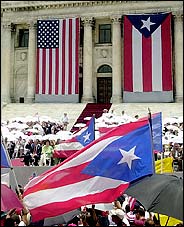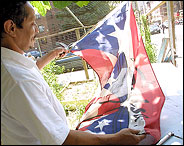|
 |
|
Esta página no está disponible en español. THE NEW YORK TIMESIn Puerto Rico, A Milestone; In New York City, Not Much CelebratingBy MIREYA NAVARRO and MARC SANTORA
July 26, 2002
Thousands gathered in San Juan, Puerto Rico, on Thursday to mark the island's 50th anniversary as a commonwealth of the United States. AP ---------- In Puerto Rico's capital, San Juan, thousands gathered yesterday to mark the 50th anniversary of the island's status as a commonwealth of the United States at a three-hour ceremony with speeches, flag-waving and even a visit from the mayor of the other capital of Puerto Rican life – New York. It was necessary for Mayor Michael R. Bloomberg and a delegation of Puerto Rican city officials to fly south in the mayor's private plane to commemorate the occasion. There were no commemorations in New York for them to attend. Considering that there are 830,000 people of Puerto Rican descent in New York, the absence of fanfare surrounding the anniversary may have seemed surprising. But it was an indication of how Puerto Ricans here are more concerned about issues that affect their daily lives and, like those in Puerto Rico, are divided on what the island's political status should be. Angel Ivel, 51, an air-conditioner repairman from East Harlem, reflected both pride in his native Puerto Rico and the reality of life here as he hoisted a Puerto Rican flag in a community garden in solitary acknowledgment of the day. "The people in New York don't pay much attention to what happens in Puerto Rico," he said. "It's a shame. They should have organized some kind of get-together."
In East Harlem, Angel Ivel celebrated the 50th anniversary on Thursday of Puerto Rico's commonwealth status. Ceremonies in San Juan drew Mayor Michael R. Bloomberg and other city officials. ---------- On the island, there is a strong pro-statehood movement struggling to make it the 51st state. There is also a small but vocal minority who want Puerto Rico to become independent. Even the Popular Democratic Party, the architect of the commonwealth and the party currently holding both the governor's office and a legislative majority, wants change. In recent years the party has lobbied Washington for more powers – for example, the ability for the commonwealth government to strike its own trade agreements – to tackle the island's considerable economic problems, including an unemployment rate of 13 percent. "The bottom line is, what's there to commemorate?" said Angelo Falcón, a senior policy executive with the Puerto Rican Legal Defense and Education Fund. "There's a consensus that the current status is not adequate for Puerto Rico anymore." The commonwealth has given the United States a military outpost in the Caribbean and one of its biggest consumer markets, while giving Puerto Ricans the benefits of American citizenship and one of the highest standards of living of any Latin people. But while subject to federal law like Americans in the states, Puerto Ricans have unequal rights and obligations. Puerto Ricans do not pay most federal taxes, and do not vote for president or receive full representation in Congress. Puerto Rico has its own laws, taxes and government but is subject to United States law, including that regarding military service. Repeated referendums on the status question have left Puerto Rico with its status quo intact. Up to now, Congress has refused to give a clear signal of what alternatives would be acceptable, with the issue of self-determination bogged down on questions about the political and economic cost of incorporating a Spanish-speaking state if Puerto Ricans chose statehood. Even with its ambiguous status, however, Puerto Rico remains essentially Hispanic, and Puerto Ricans find consensus in defending both their culture and their American citizenship. In New York, the island's status takes a back seat to bread and butter issues of education and jobs. But opinions about the island's political fate abound, and polls of stateside Puerto Ricans have shown a preference for a commonwealth. "We are citizens; we don't need green cards," said George Olivio, 49, a clerk at a hardware store in Hell's Kitchen. "We get a lot from the United States and people are comfortable. They don't want to hear about independence or statehood." But Félix V. Matos-Rodríguez, director of the Center for Puerto Rican Studies at Hunter College, noted that commonwealth status eased the migration of Puerto Ricans to New York in the years after World War II, many of them agricultural workers displaced by industrialization. "For economic development to work in Puerto Rico, there was a need to export workers because of overpopulation," he said. "There's a sense that people were shipped out. That, and the volatility of the status issue, helps explain why there's no official celebration here." Those who represent New York say people of Puerto Rican descent here are often increasingly ambivalent about politics on the island. Representative Nydia M. Velázquez, a United States representative from New York, said status was not as divisive an issue as it used to be in the city because Puerto Rican voters have increasingly turned their attention to mainland politics. "More and more Puerto Ricans understand electoral politics in New York and they see themselves at a political crossroads," she said. "Our vote could be the decisive factor in determining elections." The anniversary has not been entirely bypassed in the states. Juan Figueroa, president and general counsel of the legal defense fund, said his organization had joined a committee of mostly civic groups nationwide that is holding seminars about Puerto Rico and cultural events through the year to commemorate the date. Mayor Bloomberg attended the official celebration in Puerto Rico with a delegation of Puerto Rican city officials who flew south in his private plane, including four council members and Adolfo Carrión Jr., the Bronx borough president. The mayor read a statement from President Bush. Thousands gathered in San Juan by the Capitol building, waving Puerto Rican and American flags in a festive celebration headed by Gov. Sila M. Calderón. But thousands of others, mostly independence supporters, rallied along the waterfront in Guánica, in the island's southwest, to protest the other historic event that took place on July 25: the United States invasion of the island in 1898 to seize it from Spain. Regardless of political leanings, evident among Puerto Rico's 3.8 million people and an additional 3.4 million Hispanics of Puerto Rican descent in the states is a sense of nationhood and a persistent clinging to language. Ricardo E. Alegria, founder of the Institute of Puerto Rican Culture, director of the Museum of the Americas in Old San Juan and a Harvard-trained anthropologist, said that Puerto Rico's cultural nationalism was manifested in myriad ways, from the thousands of Puerto Ricans making a living selling arts and crafts to the civil disobedience protests against the Navy in Vieques. Despite the political and economic fusion with the world's sole superpower and concerted assimilation efforts in the pre-commonwealth era, such as English-only instruction in public schools, he said, "we think, make love and pray to God in Spanish." But commonwealth is basically a compromise: Children are taught in English and Spanish, just as they get presents both from Santa Claus on Dec. 25 and from the Magi on Jan. 6. Both the American and Puerto Rican flags snap from public buildings and at official events, where the two national anthems are also played. Under the tug of American control, Puerto Ricans have come to identify themselves as much, it seems, by what they are as by what they are not. "The United States is always the reference under which we say, `Yes, but . . .' " said Arlene Davila, an assistant professor of American studies at New York University who was born and raised in Puerto Rico and has written about Puerto Rican identity. Puerto Rico, of course, has not been immune to Americanization. Many in the island bemoan infiltrators such as Spanglish, consumerism and individualism. On the plus side, Puerto Ricans uphold American democratic values to the tune of a voter turnout in national elections that surpasses 80 percent. But the hybrid that is the commonwealth, noted Ms. Davila, "has heightened awareness of what's Puerto Rican."
|

 ----------
---------- ----------
----------